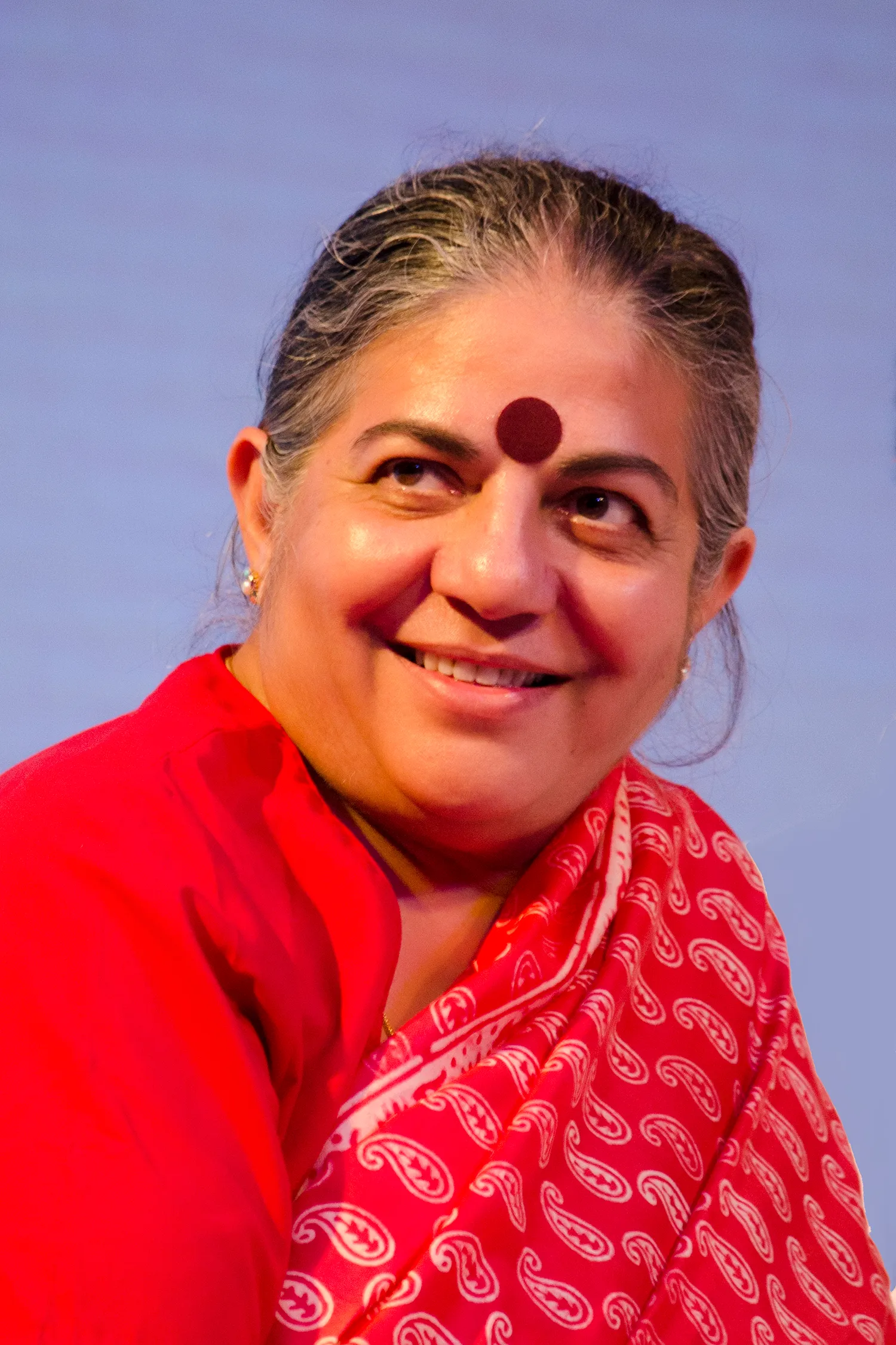At Students for a Sustainable Stanford, we center environmental justice at the heart of our work. We are committed to engaging difficult conversations at the intersection of sustainability and social justice. In order for these conversations to be effective and inclusive, we believe all stakeholders deserve a seat at the table. Even if some of those stakeholders are controversial.
These intentions helped guide our decision to invite Dr. Vandana Shiva to speak at the annual Stephen H. Schneider Memorial Lecture on January 23rd. Recognizing that people of color and marginalized groups are underrepresented within the global environmental conversation, yet often most acutely impacted by climate change, we strove to center these voices through our choice of a speaker. Dr. Shiva has received global recognition for her work to diversify the historically exclusive environmental community. Not unexpectedly, our invitation generated some controversy, including a letter of protest by a group of agricultural scientists. Their letter was also published in “European Scientist”.
The goal of this lecture was not, and is not, endorsing a single individual, ideology, or solution. On the contrary, we aimed to provoke critical thought—to spur nuanced conversations that help students examine their own values. We hope the audience left with questions about the use of technology and its ethical implications. Who develops the science? Who benefits? How are different groups affected? Ethics shape communities and movements, and evolve alongside them. Events like these provide a constructive and creative space to mold these values and ethics.
The debates surrounding modern industrial agriculture are complex and polarized. Genetically modified crops, fertilizers, and pesticides have proved instrumental to feeding our world. By integrating genetic research into developing-world agriculture, the Green Revolution saved millions from starvation. While modern farming innovations have fueled productivity gains in many areas of the world, they have also had negative consequences. Poorly-regulated, intensive agrochemical usage can lead to toxic environmental runoff and human disease. Organophosphates, a common type of chemical pesticide, are responsible for about 300,000 deaths per year worldwide, and Indian farmers are critically impacted. Industrial agriculture has expanded monocrop farming, which can cripple genomic diversity and disease resilience. The corporatization of agriculture can also threaten the political and economic agency of rural communities. When examining the impacts of technologies like GMOs, it is not simply enough to look at aggregate trends in yield and efficiency. We need higher-resolution data that incorporates food sovereignty, biodiversity, and health to holistically evaluate the impact of science on people and the planet. In her talk last Thursday, Dr. Shiva discussed the potential consequences of agricultural technology. She advocated for organic farming as a tool to empower climate activism—and a potential alternative to chemical-based agriculture.
Dr. Shiva also discussed her experiences working to protect the legal legitimacy of local and Indigenous knowledge. In 2005, her organization RFSTN (Research Foundation for Science, Technology, and Natural Resource Policy) won a legal battle at the European Patent Office against the USDA and W.R. Grace. W.R. Grace had developed an anti-fungal pesticide from neem, a medicinal herb used in India for centuries. In the US, “prior existing knowledge” such as the properties of neem are only recognized if published in a journal. As a result of Dr. Shiva’s campaign, the EPO acknowledged that the patent attempted to monopolize existing traditional knowledge and denied the appeal for re-patenting.
In addition, Dr. Shiva emphasized the unique role of women in advancing climate activism. Women in many cultures are tasked with safeguarding community health, and by extension, local agriculture and food systems. At her non-profit Navdanya, Dr. Shiva empowers female community leaders to manage biodiversity conservation projects and environmental education programs.
We recognize that Dr. Shiva has made many incendiary statements in her career. Some of them are untrue. For example, she has argued that farmer suicides in India have doubled since the introduction of Bt cotton, and that GMOs are unsafe to consume. She referenced these points during the lecture. These stances are not supported by the scientific literature, and our organization does not endorse them. Do these statements delegitimize Dr. Shiva’s entire platform? Should she be denied the microphone because some of her statements have been disproven?
No. SSS believes that we can invite a controversial speaker to campus and provide a platform for her insights on environmental justice and community-based activism, without sponsoring every statement she makes. This multi-sided discussion would be incomplete without representation from the communities most impacted by ecological change. It is also worth noting that amidst the negative feedback we received regarding the lecture, many charged criticisms came from commentators with ties to the chemical industry. This does not invalidate their claims, but does reveal some of the different incentives various stakeholders hold in this discussion.
Our club devoted immense time and energy to navigating this controversy, researching academic literature both for and against Dr. Shiva’s viewpoints, considering all stakeholders, and evaluating our club’s fundamental motivations. We drew upon our own backgrounds as aspiring social justice activists, entrepreneurs, policy researchers, computer scientists, genetic engineers, and beyond. Those of us who work closely with technologies like GMOs were especially interested to hear from Dr. Shiva. The solutions to food insecurity, climate change, resource scarcity, and poverty are only as effective as they are equitable. When developing any new technology, we must critically examine how (and if) it can be applied justly.
Underlying this event is the legacy of Dr. Steven H. Schneider, renowned climate scientist, researcher, and champion of environmental advocacy. Both Dr. Shiva and Dr. Schneider have dedicated their lives to fighting climate change, protecting natural resources, and mobilizing individuals around the world to take responsibility for the planet’s future. Many aspects of Dr. Shiva’s philosophy profoundly align with the tone and purpose of this event. While we do not agree with all of her statements, we believe that her perspective was and will be a valuable contribution to our campus dialogue on environmental justice.
—Students for a Sustainable Stanford
